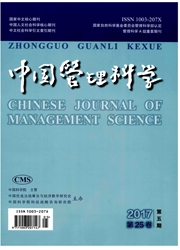

 中文摘要:
中文摘要:
基于废旧电子产品回收市场中存在处理商选择回收渠道的问题,本文构建了双链竞争下处理商回收渠道选择的博弈模型。通过文献研究,本文在总结出了回收市场中双链竞争下的四种回收方式基础上,运用博弈理论方法建立了市场机制下处理商回收渠道选择博弈模型,并用数值仿真分析了博弈均衡结果。研究结果表明:(1)混合模式下,选择直接回收渠道的处理商的回收价格最高、数量最多和利润最大;选择间接回收渠道的处理商回收价格最低、数量最少和利润最小;(2)三种模式下,回收价格、回收数量、处理商的利润和逆向供应链的利润均与消费者的敏感系数乘正比;(3)三种模式下,回收数量、处理商的利润和逆向供应链的利润均与回收竞争系数成反比;(4)三种模式下,随着成本差异的增加不管在哪种模式下处理商1的利润在逐渐增大,处理商2利润在逐渐减少。这些有益的结论能为现实中处理商管理者决策提供理论帮助和方法支持。
 英文摘要:
英文摘要:
Bosed on the fact that processors will face choosing recovery channels problem in the presence of e-waste recycling market, game model of recycling channels selection by waste electronic products treatment facilities within the context of competition between double chains is established. Through the literature review, four recycling modes in the recycling market are summed up, and the game model of the recycling channels is established under the background of market mechanism. A numerical case is further used to simulate and analyze the game equilibrium outcome. The results are as follows,Firstly, under the mixed mode, the price, quantity and profit of processors selecting direct recovery channels are up to the maximum But if selecting indirect recovery channels, the situation will be on the contrary. In Addition, under the three modes, recovery rates, the number of recovery, profits and reverse supply chain profit of processors are multiplied with the sensitivity coefficient of the consumers. Under the three modes, recovery rates, the number of recovery, profits and reverse supply chain profit of processors are inversely proportional to the recovery competition factor. Finally, under the three modes, processors 1 are gradually in- creasing, processors 2 profits are gradually reducing. These useful conclusions can provide supports for processors to make decisions.
 同期刊论文项目
同期刊论文项目
 同项目期刊论文
同项目期刊论文
 Green food consumption intention, behaviors and influencing factors among Chinese consumers (SSCI期刊)
Green food consumption intention, behaviors and influencing factors among Chinese consumers (SSCI期刊) Environmental Supply Chain Cooperation and Its Effect on the Circular Economy Practice-Performance R
Environmental Supply Chain Cooperation and Its Effect on the Circular Economy Practice-Performance R An analysis of energy-related greenhouse gas emissions in the Chinese iron and steel industry (SSCI期
An analysis of energy-related greenhouse gas emissions in the Chinese iron and steel industry (SSCI期 Diffusion of selected green supply chain management practices: an assessment of Chinese enterprises(
Diffusion of selected green supply chain management practices: an assessment of Chinese enterprises( Evaluating green supply chain management among Chinese manufacturers from the ecological modernizati
Evaluating green supply chain management among Chinese manufacturers from the ecological modernizati Mediation effects of environmental cooperation on the relationship between sustainable design and pe
Mediation effects of environmental cooperation on the relationship between sustainable design and pe Institutional pressures, dynamic capabilities and environmental management systems: Investigating th
Institutional pressures, dynamic capabilities and environmental management systems: Investigating th Green supply chain management innovation diffusion and its relationship to organizational improvemen
Green supply chain management innovation diffusion and its relationship to organizational improvemen Drivers and barriers of extended supply chain practices for energy saving and emission reduction amo
Drivers and barriers of extended supply chain practices for energy saving and emission reduction amo Guest Editorial: Sustainability in engineering management-Setting the foundation for the path forwar
Guest Editorial: Sustainability in engineering management-Setting the foundation for the path forwar How transformational leadership and employee motivation combine to predict employee proenvironmental
How transformational leadership and employee motivation combine to predict employee proenvironmental Teaching industrial ecology at Dalian university of technology: Towards improving overall eco-effici
Teaching industrial ecology at Dalian university of technology: Towards improving overall eco-effici The roles of environmental supply chain cooperation on the relationships between circular economy pr
The roles of environmental supply chain cooperation on the relationships between circular economy pr Developing the circular economy in China: Challenges and opportunities for achieving ‘leapfrog devel
Developing the circular economy in China: Challenges and opportunities for achieving ‘leapfrog devel Implementing China’s Circular Economy Concept at the Regional Level: a review of progress in Dalian,
Implementing China’s Circular Economy Concept at the Regional Level: a review of progress in Dalian, A Cross-Country Empirical Comparison of Environmental Supply Chain Management Practices in the Autom
A Cross-Country Empirical Comparison of Environmental Supply Chain Management Practices in the Autom Analytical network hierarchy based portfolio analysis for supplier management in greening a supply c
Analytical network hierarchy based portfolio analysis for supplier management in greening a supply c Evaluation of innovative municipal solid waste management through urban symbiosis: a case study of K
Evaluation of innovative municipal solid waste management through urban symbiosis: a case study of K Circular economy practices among Chinese manufacturers varying in environmental-oriented SC cooperat
Circular economy practices among Chinese manufacturers varying in environmental-oriented SC cooperat GSCM innovation diffusion and its relationship to organizational improvement: An ecological moderniz
GSCM innovation diffusion and its relationship to organizational improvement: An ecological moderniz Drivers and barriers of extended supply chain practice for energy saving and emission reduction amon
Drivers and barriers of extended supply chain practice for energy saving and emission reduction amon 期刊信息
期刊信息
